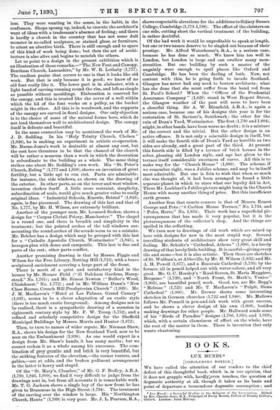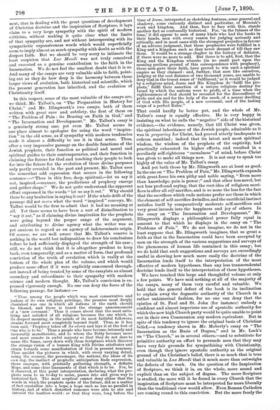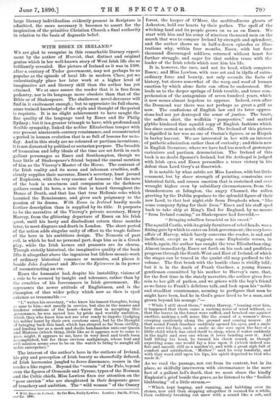BOOKS.
LUX MUNDI.* [CONCLUDING NOTICE.] WE have called the attention of our readers to the chief defect of this thoughtful book, which is, in our opinion, that it does not grapple with, hardly;even touches, the question of dogmatic authority at all, though it takes as its basis and point of departure a tremendous dogmatic assumption ; and
• Lux Matadi : a Serics:of Studies in the Religion of the him-nation. Edited by Rev. Charles Gore, M.A., Principal of Pussy Molise, Fellow of Trinity College, Oxford. London: John Murray.
next, that in dealing with the great questions of development of Christian doctrine and the inspiration of Scripture, it lays claim to a very large sympathy with the spirit of modern criticism, without making it quite clear what the limits of that sympathy are, and not without interspersing with its sympathetic expansiveness words which would superficially seem to imply almost as much sympathy with doubt as with the
deepest faith. But we should be very sorry to intimate the least suspicion that Lux Mundi was not truly conceived
and executed as a genuine contribution to the faith in the Incarnation. We do not feel the smallest doubt that it is so. And many of the essays are very valuable aids to faith, point- ing out as they do how deep is the harmony between those larger views of evolution, both historical and scientific, which the present generation has inherited, and the evolution of Christianity itself.
In this respect, some of the most valuable of the essays are, we think, Mr. Talbot's, on "The Preparation in History for Christ," and Mr. Illingworth's two essays, both of them written with great care and subtlety, the first of them on "The Problem of Pain : its Bearing on Faith in God," and "The Incarnation and Development." Mr. Talbot's essay is a genuinely strong one; yet even Mr. Talbot seems in one place almost to apologise for using the word " inspira- tion " in the old sense, as if sympathy with modern tendencies made it almost a difficulty to use it in that sense. Thus, after a very impressive passage on the double functions of the Jewish prophets, their function as political and moral and spiritual guides to their contemporaries, and their function in claiming the future for God and teaching their people to look far into the future for the evolution of those divine purposes only partly revealed in the past and present, Mr. Talbot uses the somewhat odd expression that occurs in the following sentence :—" Thus in this free, deep, spiritual,—let us say it out, inspired,—manner, the predictions of prophecy emerge and gather shape." We do not quite understand the apparent effort expressed in the words "let us say it out." Why should
there be any hesitation in saying it out? If the whole drift of the passage did not mean what the word " inspired " conveys, Mr.
Talbot would be the first to admit that it had no meaning at all. Yet there seems to have been a sort of disinclination to "say it out," as if claiming divine inspiration for the prophets were going beyond the proper range of the argument, and attributing to divine agency what the writer was as yet anxious to regard as an agency of indeterminate origin. Of course, we are well aware that Mr. Talbot's reserve is
nothing in the world but indisposition to draw his conclusions before be had sufficiently displayed the strength of his case ; still, we do not think that it is altogether prudent to keep back, even temporarily, and as a matter of form, that profound conviction of the truth of revelation which is really at the bottom of the whole plan of the volume, and which would produce more effect if it were explicitly announced through- out instead of being treated_by some of the essayists as almost secondary and subordinate to their sympathy with modern science and modern thought. Mr. Talbot's conviction is ex- pressed vigorously enough. No one can deny the force of the following passage, for instance
"Thus among the people which was most conservative and jealous of its own religious privilege, the promise most deeply cherished was one in which all nations of the earth should be blessed, and there is heard the strange announcement of a new covenant.' Thus it comes about that the most satis- fying and satisfied of all religions becomes the one which, in its deepest meaning, in the minds of its most faithful followers, strains forward most completely beyond itself. Thus, as it has been said, Prophecy takes a its crown and lays it at the feet of One who is to be.' Thus a people who have become intensely and inexorably monotheistic, and to whom the Deity becomes more and more remote in awful majesty so that they do not dare to name His Name, carry down with them Scriptures which discover the strange vision of a human King with Divine attributes and strain towards some manifestation of God in present nearness. Thus amidst the pictures in which, with every varying detail, using the scenery, the personages, the nations, the ideas of its own day, the instinct of prophetic anticipation finds expression, there emerges, with gradually gathering strength, a definite Hope, and some clear lineaments of that which is to be. For, be it observed, at this point interpretation, declaring what the pro- phets seem to us to-day to mean, passes into and gives way to historical fact. The most sceptical cannot deny either that the words in which the prophets spoke of the future, did as a matter of fact crystallise into a hope, a hope such as has no parallel in history, and of which distorted rumours were able to stir and interest the heathen world : or that they were, long before the
time of Jesus, interpreted as sketching features, some general and.. shadowy, some curiously distinct and particular, of Messiah's work and kingdom. And then, face to face with this, stands another fact as confessedly historical. For, 'in the fulness of the time,' it did appear to men of many kinds who had the books in their hands, men with every reason for judging seriously and critically, and in most cases with the strongest prejudice in favour of an adverse judgment, that these prophecies were fulfilled in a King and a Kingdom such as they never dreamt of till they saw them. It would be a strange chapter in the history of delusion, if there were no more to add. But there is to add, first, that the King and the Kingdom whereto (in no small part upon the seeming perilous ground of this correspondence with prophecy),
these men gave their faith, have proved to win such a spiritual
empire as they claimed : and, further, that men like ourselves, judging at the cool distance of two thousand years, are unable to deny that in the truest sense of fulfilment,' as it would be judged by a religions mind, Jesus and His Kingdom do fulfil the pro- phets,' fulfil their assertion of a unique religious destiny for Israel by which the nations were to profit, of a time when the righteousness of God should be revealed for the discomfiture of pride and sin and for the help of the meek, of a nearer dwelling of God with His people, of a new covenant, and of the lasting reign of a perfect Ruler."
That could hardly be better put, and the whole of Mr. Talbot's essay is equally effective. He is very happy in insisting on what he calls the " negative " side of the historical evidence,—the evidence, namely, that till Christ was given, the spiritual inheritance of the Jewish people, admirable as it was in preparing for Christ, had proved utterly inadequate to
redeem mankind ; indeed that its latest and most spiritual wisdom, the wisdom of the prophets of the captivity, bad practically exhausted its higher effects, and resulted in a peculiarly self-righteous " carnalness " of mind, before Christ was given to make all things new. It is not easy to speak too highly of the value of Mr. Talbot's essay.
And yet both those by Mr. Illingworth are at least as good.
In the one on " The Problem of Pain," Mr. Blingworth expands With great force his own pithy and noble saying, "Even more than knowledge, pain is power ;" and that other less novel, but not less profound saying, that the root-idea of religious sacri- fices is after all self-sacrifice, and is so none the less for the fact that the sacrifices which rude nations prefer are those in which the element of self-sacrifice dwindles, and the sacrificial instinct satisfies itself by comparatively moderate self-sacrigces and very great inroads into the happiness and joy of others. In the essay on "The Incarnation and Development," Mr.
Illingworth displays a philosophical power fully equal in amount to that which he displays in the essay on "The Problems of Pain."_ We do not imagine, we do not in the least suppose that Mr. lllingworth imagines, that so great a faith as that in the Incarnation could have been accepted by men on the strength of the various suggestions and surveys of the phenomena of human life contained in this essay; but we do hold that such suggestions and surveys are exceedingly useful in showing how much more easily the doctrine of the Incarnation lends itself to the interpretation of the most effective of modern hypotheses, than any less transcendental doctrine lends itself to the interpretation of these hypotheses.
We have touched this large and thoughtful volume at only a few points. We have said nothing at all of the majority of the essays, many of them very careful and valuable. We hold that the general defect of the book is its inclination to explain away the dogmatic authority of the Church in a rather unhistorical fashion, for no one can deny that the epistles of St. Paul and St. John (for instance) embody a confident and almost imperious use of apostolic authority for which the new high Church party would be quite unable to point out in their own Communion any modern equivalent. But in spite of this tendency to ignore the original basis of Christian belief—a tendency shown in Mr. Moberly's essay on "The
Incarnation as the Basis of Dogma," and in Mr. Lock's on "The Church," as in several others,—and to substitute for primitive authority an effort to persuade men that they may have very fair grounds for sympathising with Christianity, even though they ignore apostolic authority as the original ground of the Christian's belief, there is so much that is true and valuable in Luz Hun& that it much more than outweighs the defects of the work. On the question of the Inspiration of Scripture, we think it is, on the whole, more sound and explicit than on the subject of dogma. The more Scripture is studied, the more will it be found in every Church that the inspiration of Scripture must be interpreted far more liberally
than the traditional view would allow. Even Roman Catholics are coming round to this conviction. But the more freely the large literary individualism evidently present in Scripture is admitted, the more necessary it becomes to assert for the inspiration of the primitive Christian Church a final authority in relation to the basis of dogmatic belief.






































 Previous page
Previous page